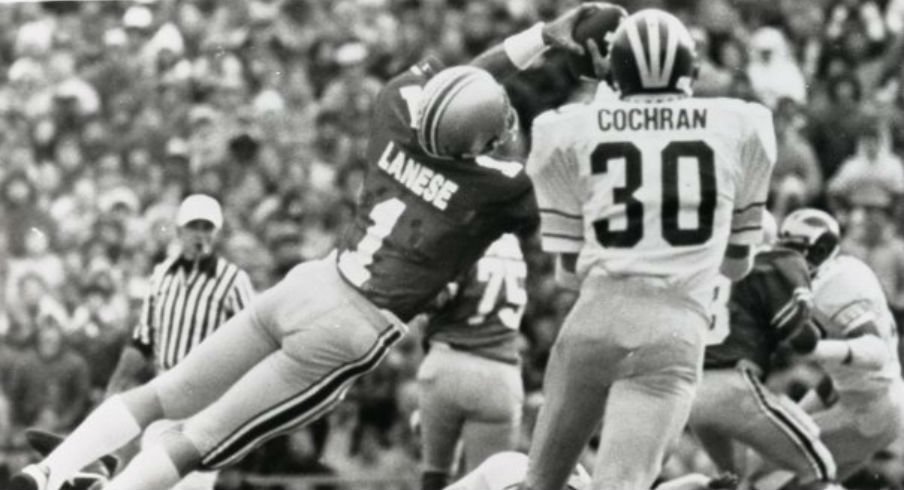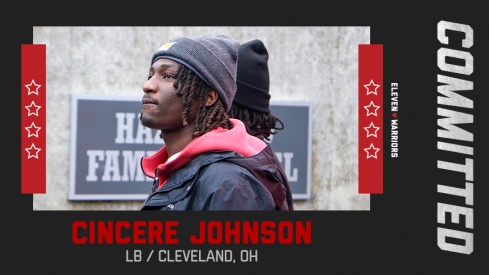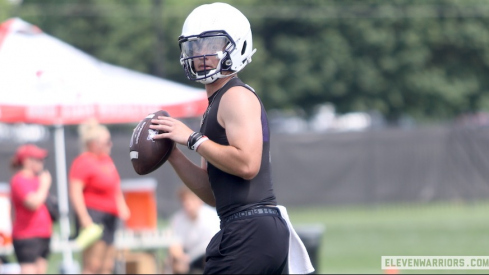Mike Lanese came to Ohio State as a tailback in 1982 and left in 1985 as one of the most memorable Buckeye wide receivers of all time.
A first-team All-Ohio running back, Lanese rushed for 1,417 yards and 12 touchdowns his senior season at Mayfield High. He was a multi-sport athlete, lettering in football, track and wrestling during his high school career.
A two-year starter at flanker, Lanese finished with 72 career receptions for 1,170 yards and six touchdowns. He also rushed 13 times for 82 yards (6.3 YPA) and two scores. As a punt returner, Lanese brought back 31 career punts for 180 yards.
In 1984 and 1985, Lanese and split end Cris Carter teamed up to become one of the school’s all-time greatest receiving tandems, playing under Earle Bruce.
Mike has returned to the Columbus area after traveling for various jobs, including a stint in the United States Navy and the Army Reserve.
He and his wife, Laura, a Grove City Council representative, have a three kids—son Michael (16) and daughters Camille (14) and Francesca (10)—and live in Grove City.
He was kind enough to go under the Eleven Warriors microscope and answer our questions.
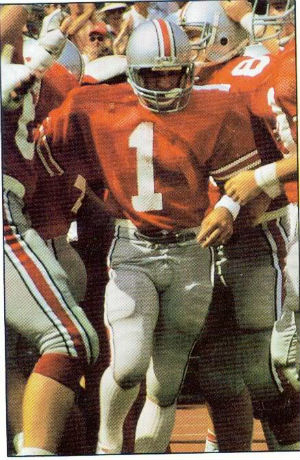
What are your earliest football memories?
Mike Lanese: My dad played at Miami of Ohio under Ara Parseghian. Football was kind of in the genes. I played backyard football from the time I could probably walk. I started playing organized football at the CYO level. I was really fortunate. I had great coaches along the way, even in CYO. I had a coach called Mr. Weisen, who was a volunteer coach, like you'd find at all the youth football programs. I was really fortunate because my first coach was a good coach and taught us the fundamentals—we spent probably 80% of our time on fundamental football: blocking, tackling, proper technique, and safety, so you wouldn't get hurt. We had very few plays in the playbook. We might have had three plays to the right and three plays to the left and possibly one pass play. The rest of it was just trying to teach young kids how to play football.
When did you truly become aware of Ohio State football and was it of any importance in your life?
ML: It was not. I'm from Cleveland and it's mostly a pro town. I didn't really follow college football at all up until probably my senior year of high school when I started to get recruited. I just didn't know a whole lot about it. Fortunately I had a great high school coach, a guy called Byron Morgan, who is now in the Ohio High School Coaches Hall of Fame. He was a great coach but also a great adviser throughout that whole process.
So I started to learn about the process, learn about the schools and started to get more interested in not just the football part of the schools, but the culture and the academic environment and life after football. That was a big deal for me at the time. What happens after you're done playing? Do kids go back? Do they stay in the same city? If they're in a different city, do they go home? Where do they find jobs afterwards? I was asking all those kinds of questions. That was the run-up to my recruiting process.
Who recruited your for Ohio State and what do you remember about the experience?
ML: The guy who recruited me first, believe it or not, was Nick Saban. It's kind of amusing because when Nick came to my house—my mom is a very traditional Italian-American housewife and mother—he was really sick. He had the flu. My mom ended up putting out the spread—chicken soup, the whole thing. I saw him probably 10 years ago and the first thing he said to me was "I cannot believe how great your mom was, taking care of me when I was sick." He remembered that after all these years.
But, I guess midway through the recruiting process, a couple of defensive coaches got let go. So I ended up getting a call from a new guy, (former defensive line coach) Randy Hart, and he said, "by the way, I'm your new recruiter at Ohio State." Randy and I got to be good friends. He's a terrific guy and he's been coaching a long time, mostly on the West Coast.
Ohio State and Michigan were your finalists, and for a while you were a Michigan lean. What brought you to your senses?
ML: Back in the day, I think Michigan probably did a better job recruiting the Cleveland area than Ohio State for whatever reason. Bo had just been able to get his hooks into Cleveland area schools. It was kind of a foregone conclusion when I was getting recruited—my dad had played for Bo at Miami and there were a couple of assistants on his staff who knew my dad—in everyone's mind, including my own, that I would end up at Michigan. They wanted me to play flanker. They had a guy called Anthony Carter, who was going to be a senior when I was a freshman. When I was a sophomore, the thought was that I'd step in and play flanker. And that's where I was leaning up until the very end.
But I made the visit to Ohio State and I gave it a fair shot. I went in with an open mind. I liked Earle a lot. In my head I wanted to play tailback even though I was probably pretty small to do so. He said, "if you want a shot at playing tailback, I'll give you a shot at playing tailback." And that's all I needed to hear from the football side. But there was a lot that just kind of clicked for me at Ohio State. Being in state, it matters. It matters that there's an alumni network throughout the state. It matters that there are great professors who are interested in the academic success of student athletes. All that stuff really matters.
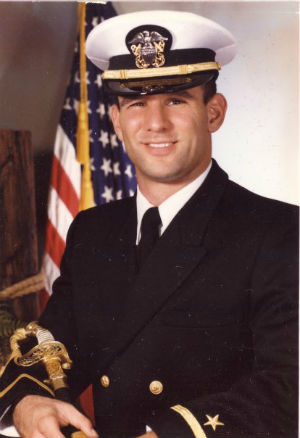
I had pretty much intimated to the guys at Michigan that I was going (there). My recruiter up there was a guy called Gary Moeller. So Gary was a guy I had to call when I decided to change my mind and that was not a very happy experience. Here I am a 17-year-old kid telling a guy that what he thought was going to happen wasn't actually going to happen. He lit me up on the phone for about 10 minutes. I was shaking.
What are your earliest memories of walking into practice at Ohio State?
ML: Everyone's trying to feel their way around and back then we didn't have ESPN and the internet, so we didn't know about any of the other players. So you're walking in an you've kind of heard of some guys. They might have played in the North-South All-Star Game. They had great stats and credentials and awards and accolades and all that kind of stuff, but you really never knew who was good, who wasn't good, who was going to play what position until you got down there for freshman camp.
And I remember walking in and thinking I was going to get a good shot at tailback, and then I found out we also recruited four other all-state tailbacks and one of those guys was called Keith Byars. So I met Keith and I looked at him and I said to myself, "there's no way he's a tailback. Maybe a fullback but probably a tight end or a tackle or something." He was a big dude, huge hands. And I said "this is going to be an uphill battle." Tim Spencer was the number one tailback at the time. That's the memory that sticks with me the most—just the intimidation of finding all these other great athletes in one place.
What did you enjoy most about being teammates with so many of those guys?
ML: It's a great experience to meet guys from different backgrounds. My senior year I was a co-captain with Keith Byars and Pepper Johnson. Growing up, I came from a very different place, culturally, from those guys. One of the great things about Ohio State football was that it got you into a new situation -- a situation where you had to meet people from other cites, other places and cultures. It was one of the best things that could have happened. Those are the friendships that last a long time.
What was it like to be paired up on the field with a young Cris Carter, and what was he like to be around?
ML: Cris was a different breed of cat. The first time I heard about Cris Carter I was staying at Ohio State for summer school between my sophomore and junior year. Coach Tressel came up to me and said, "so, you're staying for summer?" And I said "yep coach, I'm going to get a couple classes knocked out." He said, "you've got a roommate." And I said, "no, I don't have a roommate." And he said "no, you don't understand. You have a roommate. There's this kid coming in from Middletown and we want to pair him up with you for the summer just so you can watch over him a little bit." I said "you've got to be kidding me."
That was the start of it and in walks Cris Carter, larger than life, bombastic, charismatic—exactly what you see right now on TV. It was an experience that I'll never forget.
What are some of the games or individual plays that stick out to you?
ML: I don't remember a whole lot of the details from the games. I don't remember the scores from a lot of games. What strikes me as interesting is I remember a lot of plays that didn't go well. The plays you always want back. A couple drops that I never should have dropped. The plays where I kicked myself then and I kick myself now are, unfortunately, the ones that stick with me the most.
The fans will remind you of the good things that you did. Ohio State has the best fans in the world and it's that relationship they have with the players and the former players that I think makes this place so special.
You were able to get a couple of wins against That Team Up North during your OSU career. Can you describe the difference between beating Michigan and beating, say…Indiana or Iowa?
ML: It was a different season. Really, it was a different game altogether. The level of intensity, the level of competition, the level of talent was just so much different from anyone else we played that year -- all four years. As a football player you think one game pretty much blends into the next, but it's not the case. When you play Michigan, things just move a little bit faster, people hit just a little bit harder, the game just plays a little bit tougher.
As a two-time Academic All-American, obviously you took your classwork very seriously. What advice do you give the new class of OSU freshmen football players on how to approach their studies?
ML: The thing you have to do when you walk in is understand time management, more than anything else. Your day is going to be full. Something has to get left out and often times that has to be a lot of the social life. I always said you can't do three things and do them all well. There's football, there's academics and then there's the High Street scene. I saw guys get in all kinds of trouble because they weren't able to keep that relationship to what it really had to be.
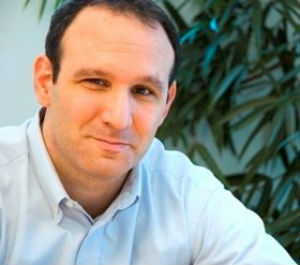
What was your experience like at the University of Oxford in England as a Rhodes Scholar?
ML: It was an incredible experience from an academic perspective, from a cultural perspective, and just from a perspective of getting to meet guys and women who have gone back to their countries of origin and been successful in business, government and academia. You just have such a wonderful opportunity to meet really interesting people on a daily basis.
What was training camp with the Cleveland Browns like under Marty Schottenheimer?
ML: The whole thing was kind of surreal because I hadn't played in two years. I hadn't put on a helmet or done anything for two years. I came back and said "I really want to give this a shot. If it works out, great. If it doesn't work out, at least I'll get it out of my system."
I got into the first week of training camp and ended up pulling my hamstring like on the first or second day. Here I was, rusty from not having played in two years, not in the best shape I'd ever been, and I'm injured. It was an uphill battle from the beginning and they had a bunch of good receivers at the time, one of whom was called Brian Brennan.
When I got healthy enough to play, I remember walking out of the locker room one day and catching a glimpse of myself in the mirror on the way out. I had a helmet on, my pads, my uniform on and there was just something that hit me at the time and I said "what are you doing? You're supposed to be doing other things right now." And that was it. At that point I knew I was done. That was my moment. I ended up getting cut a week later and decided to never look back.
You served as an officer in the U.S. Navy. What effect, if any, did your Navy experience have on your enjoyment of the season-opening Ohio State-Navy game?
ML: I love that game. Those are my two favorite college football teams. I wrote a blog about it last week. For Ohio State guys to get a chance to play Navy has to be a great experience and a learning opportunity for both sides. For the Ohio State guys, I know that Coach Tressel started the tradition a couple years ago and then Coach Meyer carried it on this year, to try to understand that a lot of these kids you're playing with against Navy—when they graduate, they're not going to be signing NFL contracts. They're going to be sailing into harm's way. They're going to be marines. They're going to be deployed to very dangerous places. For a lot of those guys, they're not going to be home very much. They're going to be at sea for nine, 12 months at a time, not seeing their families—sometimes missing the birth of their children. That's a hard life. I hope the guys on the Ohio State side, as well as the fans, at least developed a little appreciation for how difficult life is for those kids.
How are you spending your time these days, professionally?
ML: I started a company a couple years ago with a business partner. We have gotten into a couple of tech startups. The last one was a company called ClearSaleing, an advertising analytics company. We worked with big companies, Fortune 500 companies, to help them understand whether the investments they were making in advertising were actually generating some kind of return. If they weren't, we tried to help them understand what they needed to do to make those investments perform better.
We sold that company and then started SmartCrowdz. It's a website and a mobile app for event management. We help event planners market, manage and monetize their events.
According to the 1982 OSU Media Guide, your hobby at the time was collecting comic books. Which titles did you read and do you still collect them?
ML: I do not collect comic books anymore. But my favorite comics at the time were Daredevil and Master of Kung Fu. I still have them. They're locked away somewhere at my mom's house in Mayfield, Ohio. One day I'll go back and look at them and hopefully that'll be my retirement.
What’s your favorite OSU tradition?
ML: It's one that the fans really can't see, unfortunately. They probably do something like this now, but back then we stayed at a hotel for every game, whether it was an away game or a home game. On a Saturday, the whole team gathers in the lobby, you go outside, and you go for a walk—maybe a half a mile, just to get the blood going. That's where you can actually start to get your head right for the game. That's when you can start to look at the guys around you and see the look on their faces. And it puts you in the right frame of mind to get ready to play that day. It was more of an experience of camaraderie than anything else.
How closely do you follow the team now?
ML: I try to catch as many games as I can. I've got kids in their busy years. Boy, sometimes breaking away for a day is awfully tough, but I watch them on TV if I can't get down there.
Do you have any really good Earle Bruce stories you can share with us?
ML: There was a practice and Earle always knew which buttons to press, at least with me. So, at one of our practices he thought my mind was elsewhere. And this was just after I'd won the Rhodes, so it was probably leading up to the Michigan game. Allegedly, I ran the wrong route on one of our plays. So he just runs down the field yelling "that has to be the dumbest guy I ever coached!" So, juxtaposed with what I'd just gone through, it was a very humbling experience and it was exactly the right thing to do, because it got my head back in the game.
